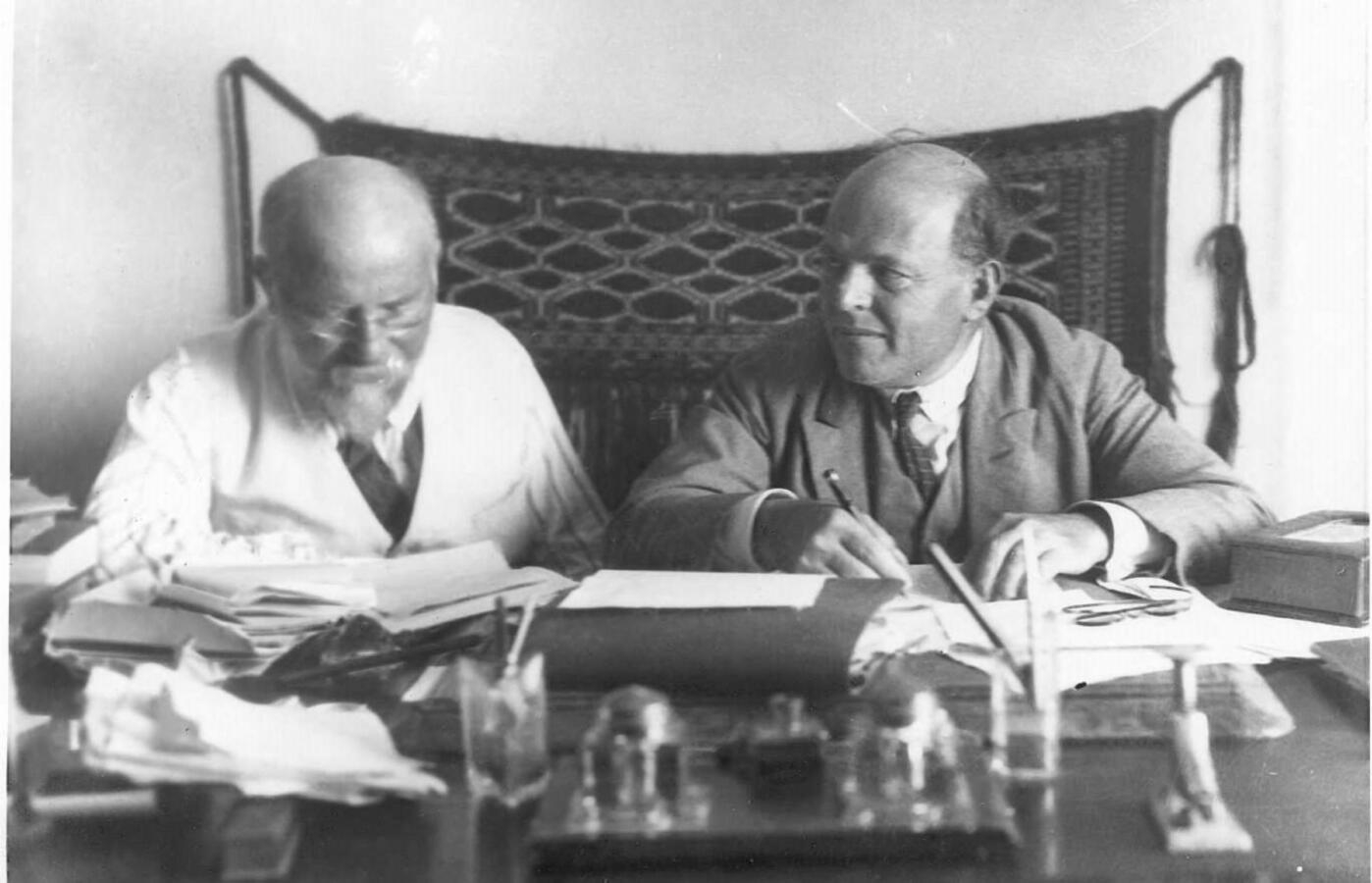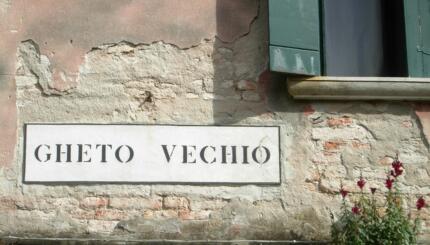Hayim Nahman Bialik was born on January 9, 1873 in Radi, a small town in the Ukraine. When he was five, his father’s business failed and the family moved to Zhitomir, the capital of Volhynia. Two years later his father died and his mother, unable to support the family, handed the children over to other relatives.
Early Years
Bialik was raised by his grandfather, a wealthy businessman and religious Jew who imposed a strict Jewish education on his wild and undisciplined grandchild. By the age of 13, Bialik had the reputation of an ilui–an intellectual prodigy–and was consulted on questions of Jewish law. At 17, he left to attend the famous yeshiva at Volozhin. There, he wrote his first poems and became attracted to the secular-nationalist writings of Ahad Ha’am.
Bialik soon became a full-fledged Zionist and–without telling his grandfather–left the yeshiva in the hopes of attending university or a modern rabbinical seminary. Bialik traveled to Odessa–the center of the new, secular Jewish culture. There he met Ahad Ha’am, Moshe Leib Lilienblum, and other cultural Zionist leaders. He began publishing–one of his first poems was El Ha-Tzippor (“To the Bird”), a lyric of longing for Zion–and was soon recognized as his generation’s most promising Hebrew poet.
In 1893, Bialik returned to Zhitomir to marry Manya Averbuch and work for his father-in-law as a timber merchant. Alone in the forest for days on end, Bialik wrote prolifically. Alongside poems with pronounced nationalist themes, such as “Blessing of the Nation,” he produced “Ha-Matmid,” a depiction of a yeshiva student, in which Bialik worked through the theme of self-denial in pursuit of a higher ideal.
With your help, My Jewish Learning can provide endless opportunities for learning, connection and discovery.
In 1897, after the collapse of the family business, Bialik moved to Sosnowiec, a town on the Prussian border, and from there, in 1900, back to Odessa. After working as a teacher and a merchant, in 1903 Bialik was appointed the joint editor of Ha-Shiloah, a Hebrew periodical founded by Ahad Ha’am. Following the first Zionist Congress of 1897, Hebrew poetry took on new importance, and despite the fact that most of his poems articulated not hope but grief and despair, Bialik was hailed as a prophet of Jewish nationalism.
City of Slaughter
In 1903, Bialik was commissioned by the Jewish Historical Society of Odessa to travel to Kishinev, a town in Bessarabia (now Moldova) where in the course of a three day pogrom 47 Jews had been murdered. His experience interviewing the survivors led him to write the epic “City of Slaughter,” which reflects the poet’s bitterness at the absence of justice and the indifference of nature, but also attacks the Jews who had done nothing to defend themselves in the face of the violence. The poem reads:
| To the graveyard, beggars!
Dig up the bones of martyred father and brother, fill your sacks, sling them on backs And hit the road to do business at all the fairs; advertise yourselves at the crossroads so everyone sees, in the sunshine on filthy rags spread the bones and sing your hoarse beggar song, beg the decency of the world! Beg the pity of goyim! Eternal beggars! |
Bialik’s criticism resonated with the Zionist goal of effecting a revolutionary transformation of the Jews into a proud, even warlike, nation. The poem circulated in Hebrew and Yiddish versions, as well as in a Russian translation by Revisionist Zionist leader Vladimir Jabotinsky.
In these years, Bialik realized his full power as a poet, raising Hebrew lyric to the level of the great European romantic poets. Alongside “City of Slaughter” and other “poems of wrath,” whose inflammatory tones influenced not only Zionists but a generation of Jewish Communist revolutionaries, Bialik composed poems about nature and lost love. Yet even his love poetry was marked by disgust and despair at the failure of passion:
| I was innocent, no storm of lust
had fouled me Till you came. I, foolish boy, cast down at your feet, mercilessly, my purity of heart and soul, the tender flowers of my youth. (From Hungry Eyes, 1897) |
Confession of Loss
In 1905, Bialik published “Scroll of Fire,” a nine section experimental prose poem. The poem weaves Talmudic legends into a romantic allegory of national and personal trauma.
“Scroll of Fire” begins with a powerful depiction of the destruction of the ancient Temple, yet the poem was also inspired by the burning of Odessa in 1905, the memory of childhood fires, and an intense extramarital relationship. Drawing on a Talmudic legend and the Song of Songs, Bialik describes the words of the last surviving boy–a character representing Hope–to the only girl not to commit suicide in the wake of the catastrophe:
| All my life my soul cried out to you in a
thousand voices, and in tens of thousands of ways, crooked and invisible, fled from you to you Even as a baby in the black of night, I saw your beauty and covered your hidden light … With the sorrow of a mother the golden light of your eye rested on me … at night like a weaned child on his mother’s lap I made my love known and I waited. |
“Scroll of Fire” is a confession of loss, and reflects Bialik’s ambivalence about his public role. It begins with a national catastrophe but uses this event to address deeply personal issues, and articulates the poet’s guilt about subordinating a greater issue to a merely–but more powerfully–personal event.
Bialik’s writing was influenced by many factors happening around him: the ambiance of the Russian Pale of Settlement, the new traditions of hasidism and haskalah (Jewish Enlightenment), the Romantic Movement, ongoing anti-Semitism, and growing Zionism. His poetry was marked, perhaps above all, by the use of a sweeping array of Jewish sources, from the Bible, through Talmud and Midrash, to medieval and modern poetry. These sources were quoted and paraphrased, often ironically or in a misplaced context, to achieve artistic richness and to thrill an audience itself imbued with a deep knowledge of the tradition.
Bialik’s primary literary influence was the pioneer of Hebrew and Yiddish fiction, Mendele Mokher Sefarim (S.J. Abramowitz). The older writer shared Bialik’s experience of orphanhood and abandonment by his mother, and the two developed a close emotional bond. On the ideological front, Bialik was decisively inspired by Ahad Ha’am and his calls for a Jewish cultural renaissance. Some have argued that the poet’s creativity was stunted by Ahad Ha’am’s didactic, ideological approach to art.
Forays into Publishing
Bialik’s poetic output dropped off in 1906 as he focused on his publishing business. He began to collaborate with Y.H. Ravnitzky on Sefer Ha-Aggadah, a comprehensive compilation of legends culled from Talmudic and midrashic literature. The book was part of Bialik’s project of kinnus, or ingathering, an attempt to collect the fragments of Jewish literature from all countries of Diaspora. He believed they would bring about an emergent Jewish national consciousness.
But Bialik’s conflicted preference for the personal over the public found expression again during a visit to Israel in 1909. He tried to give readings of his more personal work, but audiences insisted on hearing his poetry of hope and national revival. The acclaim he received aroused the same bitter feelings evident in many of his poems. As he wrote to his wife from Jaffa, “The people regard me as someone worthy of respect, but I know that I am a nothing, a nobody.”
Bialik’s despair grew. As he wrote to a friend in 1909, “Sometimes I think I’m going mad. I lack nothing, it seems, but I have no peace of mind. What is it? I don’t know. Big and little sins gnaw at me like worms. At night I don’t sleep. I’m worn out by ugly idleness, and I feel that I’m wallowing in a filthy pit.” In “A Twig Fell” (1911), the poet is obsessed with death, seeing himself as a broken, useless twig, hanging from a branch.
Dramatic historical events of 1917-1920–the Bolshevik revolution, the Balfour Declaration, and pogroms that swept Eastern Europe in the wake of the First World War–prompted Bialik to leave Russia. He traveled to Berlin and in 1924 settled in Palestine.
Lasting Legacy
In Tel Aviv, Bialik reorganized his life. He reestablished the publishing house he had started in Odessa, served on the board of the Hebrew University and as the honorary president of the Hebrew Writers’ Union, and traveled to the United States as an emissary for the World Zionist Organization. He edited collections by the medieval Hebrew poets Moses ibn Ezra and Solomon ibn Gabirol, and he published poems, songs, and reworkings of biblical stories for children.
Bialik has influenced entire generations of Zionists, including tens of thousands who were exposed to his poetry as part of the Israeli school curriculum. He wrote Hebrew poetry at a time when it was far from clear that Hebrew would become the spoken language of the Jewish community in Israel.
His experiments in rhyme and meter–he pioneered free verse and prose poetry in Modern Hebrew–opened up possibilities for the future development of Hebrew literature, and his impact is felt in the work of almost every subsequent writer, from Agnon and Joseph Hayim Brenner through to Uri Zvi Greenberg, Natan Zach and Yehuda Amichai.
Although many of Bialik’s personal poems have been misinterpreted in the light of nationalist preoccupations, his power as a poet comes from the force of personal trauma that underlies his poetry’s national themes. He speaks for his exiled, traumatized people out of his own personal biography of abandonment and separation.
In 1934, Bialik published Orphanhood, a four-part recreation of his life’s greatest trauma: the loss of his mother and father. A few weeks later, on July 4, 1934, he died of a heart attack while visiting Vienna. His death was mourned by Jews around the world as a national tragedy.
Moshe
Pronounced: moe-SHEH, Origin: Hebrew, Moses, whom God chooses to lead the Jews out of Egypt.
Talmud
Pronounced: TALL-mud, Origin: Hebrew, the set of teachings and commentaries on the Torah that form the basis for Jewish law. Comprised of the Mishnah and the Gemara, it contains the opinions of thousands of rabbis from different periods in Jewish history.
Yehuda
Pronounced: yuh-HOO-dah or yuh-hoo-DAH (oo as in boot), Origin: Hebrew, Judah, one of Joseph's brothers in the Torah.
yeshiva
Pronounced: yuh-SHEE-vuh or yeh-shee-VAH, Origin: Hebrew, a traditional religious school, where students mainly study Jewish texts.



